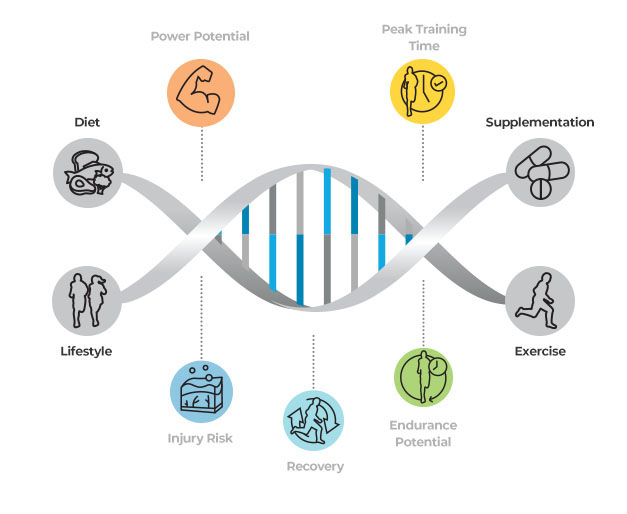How the ACTN3 Gene Affects Muscle Strength and Power in Athlete Sprinters
Discover the Powerhouse Gene Behind Top Sprinters
Sprinting is one of the most exciting events in athletics. The explosive power and speed required to excel in this sport make it an exceptional challenge for athletes. Have you ever wondered what sets elite sprinters apart from the rest of us? Although training and diet play a significant role in developing sprinting abilities, genetics also have a considerable impact.
One gene that has gained significant attention in recent years is the ACTN3 gene, a hidden gem in the world of athletic performance and sometimes referred to as ‘The Sprint Gene’. This gene plays a crucial role in muscle strength and power in sprinters, giving them a competitive edge over their opponents. Knowing which genotype you have could unlock your athletic potential
In this article, we will delve into how the ACTN3 gene affects muscle strength and power in athlete sprinters.
- What is the ACTN3 gene
- How it affects your muscle strength and power as an athlete
- How to discover your ACTN3 gene phenotype, and
- How you can use this knowledge to improve your training and performance.
The Science Behind the ACTN3 Gene
So, what is the ACTN3 gene, and how does it influence muscle strength and power? The ACTN3 gene is responsible for producing a protein called alpha-actinin-3, which is primarily found in fast-twitch muscle fibers. These fast-twitch fibers are responsible for rapid, forceful muscle contractions producing the explosive movements used extensively in sports such as spinting, making them crucial for sprinting and other power-based sports.
The ACTN3 gene is found on chromosome 11 and has two variants: R (for the presence of the protein) and X (for its absence).
What are the variants of the ACTN3 gene?
There are two versions of the ACTN3 gene: the R allele and the X allele. Individuals with at least one R allele (i.e., RR or RX genotypes) produce the alpha-actinin-3 protein, while those with the XX genotype do not.
Studies have shown that elite sprinters are more likely to possess the RR or RX genotype compared to non-athletes.
How does the ACTN3 gene affect sprinting performance?
Studies have shown that athletes with the R variant of the ACTN3 gene have a higher percentage of fast-twitch muscle fibers than those with the X variant. This is because the R variant produces more alpha-actinin-3 protein, which enhances muscle contraction and improves the ability to generate force quickly.
In sprinting, the ability to generate force quickly is essential, as it is required to propel the body forward. The higher percentage of fast-twitch fibers in athletes with the R variant of the ACTN3 gene gives them an advantage in generating explosive power and speed during sprints.
The Story of Susan, the Unlikely Sprinter
Before diving into how more about the ACTN3 gene, let me tell you about Susan. Susan was an average 12-year-old with no notable athletic achievements. She loved sports but never considered herself particularly fast or strong. One day, her parents decided to have her DNA tested for health reasons. The results? A surprising revelation – Susan had the ACTN3 gene!
With this newfound knowledge, Susan’s parents encouraged her to train as a sprinter. Within months, she began outperforming her peers and eventually became a top-ranked athlete. Susan’s story is a prime example of how understanding the ACTN3 gene can impact an individual’s athletic journey.
Can the ACTN3 gene predict an athlete’s sprinting ability?
While the ACTN3 gene is a crucial factor in sprinting performance, it is not the only one. Many other genetic, environmental, and lifestyle factors influence an athlete’s sprinting ability. Therefore, it is not possible to predict an athlete’s performance based on their ACTN3 gene alone.
However, genetic testing for the ACTN3 gene can provide valuable insights into an athlete’s muscle composition and potential strengths and weaknesses. This information can be used to tailor training programs and optimize performance.
Maximizing sprinting performance with the ACTN3 gene
Athletes can maximize their sprinting performance by incorporating training strategies that target their muscle fibers’ strengths and weaknesses. For example, athletes with the R variant of the ACTN3 gene may benefit from explosive and power-based training, while those with the X variant may benefit from endurance training.
Unlock Your Sprinting Potential: Get Tested for the ACTN3 Gene
Curious about whether you have the powerhouse ACTN3 phenotype? There’s only one way to find out: get your DNA tested. A simple blood test can reveal your genotype and help you determine if you have the potential to excel in sprinting or other power-based sports.
DNA SPORT – Optimal Sport for Life
The DNA Sport Test from DNALife reports on the ACTN3 R>X gene variation in the musculoskeletal properties of the performance sections of the report
ACTN3 is a component of Type II (fast twitch) muscle fibres and greatly influences power development.
The RR genotype is linked to a greater percentage of fast twitch muscle fibres, an advantage for strength, speed and power with training. Individuals with the XX genotype have an advantage with regards to aerobic training which is believed to be due to a greater percentage of slow twitch muscle fibres.



Embrace Your Genetic Makeup and Reach for the Stars
Understanding the role of the ACTN3 gene in athletic performance is just one example of how DNA testing can help us unlock our potential. Whether you’re a budding athlete like Susan or simply curious about your genetic makeup, don’t hesitate to explore the world of DNA testing.
Once you’ve determined which alleles you possess, you can use the information to your advantage by tailoring your training and diet, and choosing the right sports supplements.
So go ahead, get tested, and embrace your genetic gifts! Order your DNALife Sport here>>

SITE DISCLAIMER
© Equilibrium Health 2023 | Privacy Policy | GDPR | Terms & Conditions


